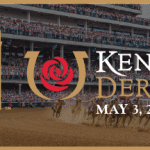Charles Town: Zimny bullish as he leaves the track
Erich Zimny is optimistic about the future of Thoroughbred racing. That’s a trait that’s probably served him well during the last 14 years that he’s served as the head of racing at Charles Town Races.
Zimny, whose title is Vice President of Racing and Sports Operations, ends his time at Charles Town this week and is headed to Ohio, where he will be assistant general manager of the Hollywood Columbus casino.
“Around the country, racing obviously needs to clean up a lot of things. I don’t think that’s a secret,” Zimny said in an interview. “But you can’t convince me that when you see these premier race meets and these big days, like the Derby, Preakness, whatever, where there’s a ton of fans, that there’s not an appetite for racing at some level in perpetuity. I really believe that.”
Zimny’s Charles Town sojourn certainly rates as a consequential one. It includes the advent of the Charles Town Classic, which became the first Charles Town race to attain graded status and was quickly followed by the track’s second graded race, the Charles Town Oaks.
During a time when parimutuel handle has been flat nationwide, he’s overseen significant growth at Charles Town. While nationwide handle declined slightly between 2009 and 2021, wagering on Charles Town’s product grew by 87%, to more than $320 million in 2021, and handle per race nearly tripled.
Those facts – the presence of graded stakes and the rise in handle – are not unrelated. In fact, Zimny calls the Charles Town Classic, which debuted in 2009 and attained graded status two years later, “the linchpin” of the track’s growth strategy.
“Being the most prominent and preeminent nighttime signal in Thoroughbred racing, that was kind of always the vision and the goal,” Zimny said. “One of the things we needed to get there was some tie into the national racing scene, some big-picture event that got people to tune in and recognize it as a track that was more than just 175 days a year.”
That effort got a remarkable, and unexpected, boost its very first year. The track had hoped, he said, to persuade trainer Nick Zito to send Da’Tara, second-tier runner who was the prior year’s longshot Belmont Stakes winner, to Charles Town, reasoning that the presence of a Belmont winner would boost interest. Zito demurred, instead sending Commentator, a two-time winner of the Whitney who was considered one of the top older horses in the country.
- April Midlantic stakes schedule
 Which stakes are taking place this month around the Mid-Atlantic? Answers within.
Which stakes are taking place this month around the Mid-Atlantic? Answers within.
Even better: it was the locally trained Researcher, coming from Jeff Runco’s Charles Town barn, who won that first Classic.
Reeling in one of the nation’s top older horses proved that, with the right money and timing, high-end barns and horses would come to Charles Town, quieting one group of doubters. And Researcher’s win, which he would repeat the following year, demonstrated that with the right horse, local horsemen could contend, quieting another.
“Some of the local horses and local horsemen, they probably needed that stage at their home venue in order to shine,” Zimny said. “Researcher was a horse that won wherever, but the fact that was there was now a million-dollar race where he could run out of his stall and run in, that was a huge deal.”
Ten years later, the Tim Grams-trained Runnin’toluvya drove the point home again, with the added benefit that he was a West Virginia-bred.
Over the years, of course, there’s been some concern among horsemen about the size of the Classic purse – it looks like a lot of money usually, though not always, going out of state – but a bigger problem arose in 2018.
That year the state Racing Commission first tabled and then rejected the track’s stakes schedule, citing the then-$1.2 million Classic as the primary concern.
“I have a problem with $1.2 million for the Charles Town Classic,” commissioner Ken Lowe said at the time. “I think the money could be better spent. I cannot justify giving $1.2 million to a horse who, 99.99 percent of the time, is going to be from out of town. I don’t see the benefit to the community.”
After West Virginia Governor Jim Justice, who had appointed two of the three commissioners, announced his staff was reviewing ways “to have the decision reversed,” the Commission did so itself, voting unanimously to approve the Classic and the rest of the open stakes program.
The rejection of the stakes schedule was not his darkest day as a racetrack exec, though, Zimny said. That had come earlier, in 2015, when arguably the top racehorse in the nation, Shared Belief, came East for the Classic but did not complete the course and was vanned off.
“That was the worst one – not even close,” he recalled. “It was brutal. I felt so bad for the connections. I felt so bad for this place.”
Has that affected field quality for the Classic in the years since? Have some horsemen steered clear as a result?
Zimny says not. He said that he “badgered” Shared Belief’s rider Mike Smith about whether there were issues with the surface and that Smith said there were not, as did others who rode that day.
It’s true some recent winners may not have been quite as strong as stars like Game On Dude, who won the 2013 Classic en route to earning $6.5 million in his career. On the other hand, Hall of Fame trainer Bill Mott, known as a cautious and careful horsemen, sent Art Collector to win last year’s Classic, and he then turned around to win the Grade 1 Woodward in his next start.
Since 2020 Charles Town has combined the Classic and the Oaks on a single card in August. That came about of necessity at first, when Charles Town was shuttered on what would have been Classic day because of the Covid-19 pandemic.
- Coal Battle’s West Virginia connection
 Kentucky Derby contender Coal Battle has a couple of big fans in West Virginia, whose connection is through the horse’s WV-bred dam.
Kentucky Derby contender Coal Battle has a couple of big fans in West Virginia, whose connection is through the horse’s WV-bred dam.
This year will mark the third summer Classic when it takes place August 26. Last year’s combined Oaks-Classic card pulled in a track-record of nearly $7.2 million in all sources handle.
Zimny, a New Jersey native, was a practicing attorney before switching gears, attending the Race Track Industry Program at the University of Arizona, and landing the Charles Town job.
Looking ahead, he sees some changes he thinks would strengthen Charles Town’s program, though it’s doubtful they’ll attain much purchase among other constituents.
For one thing, he says he believes fewer days of live racing would make for a better product, with fuller fields. Field size at CT dropped to 7.2 runners per race in 2021, the lowest number in at least the last 13 years. He argues that, since most of the purse money available is generated by slot machine revenues rather than parimutuel wagering, it’s essentially a static pool. That means that reducing days would have virtually no impact on the amount of purse money won by horsemen over the year.

Incoming head of racing Charlie McIntosh “is not gonna like me leaving him with this comment, but the truth is we produce a product. I know we don’t think of our sport as producing a consumable product, but we do,” Zimny said. “And if there’s not more emphasis on the quality of the product, how do we think we’re going to push this to be as self-sustaining as it could be?”
Horsemen generally oppose reductions in days, and the 1,409 races the track conducted in 2021 was its largest number since 2015.
He also argues that Charles Town’s racing program has become perhaps too “heavily slanted towards West Virginia-breds.”
“If you were a trainer or an owner who had a non West Virginia-bred, would you send them here with the number of opportunities there were to run?” he asked. “I don’t know, it’s been tough to get those kinds of horses here over the last several years.”
The answer, he suggests, is to modify the West Virginia breeding program to encourage breeding “the best horses possible.” He said he’d like to see the program provide some benefits to horses running out of state as a way of encouraging local breeders to breed more regionally or nationally competitive horses.
And, of course, there are the unknowns as to how the implementation of the Horseracing Integrity and Safety Authority (HISA) rollout takes place over the coming months. The federally mandated program is embroiled in several lawsuits challenging its constitutionality.
If it does go forward, Zimny said, he expects it will cost Charles Town “millions of dollars.”
He added, “The cost that comes with HISA is unquestionably a hardship on the horsemen and the racetrack. It’s a lot of money.”
Still and all, he said he remains “bullish” on Charles Town’s racing future. What attracted him in the first place – “a stable business environment” with the casino, “no issues with purse money,” a good team – remains in place.
“It was certainly a team effort, but we achieved results that I honestly didn’t even think that we’d be able to get to,” he said. “If you had told me 12, 13, 14 years ago, we would triple wagering volume per race, I would have probably laughed.”
LATEST NEWS

















